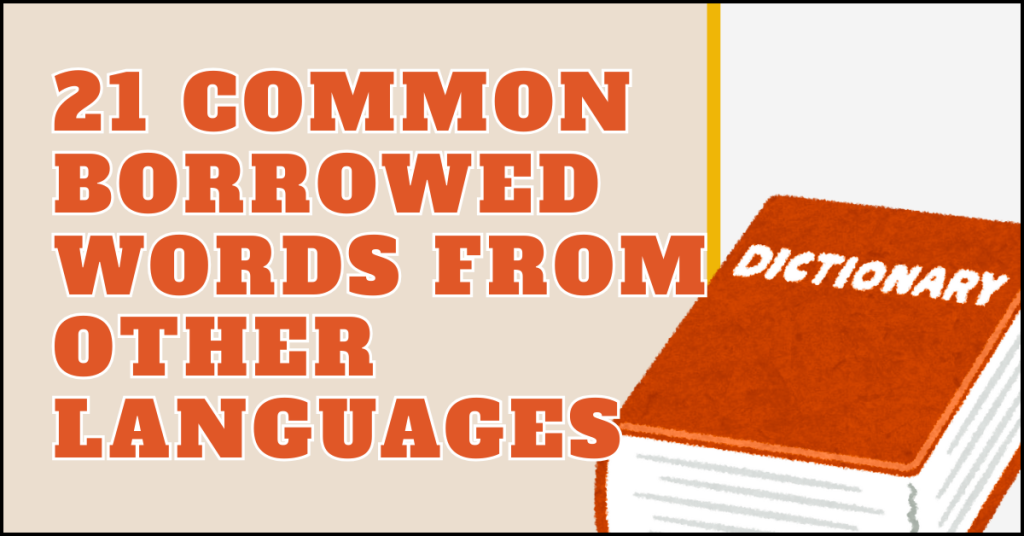English is a notorious word thief. As one witty saying goes, it doesn’t politely borrow words. It follows other languages down dark alleys, knocks them over, and rummages through their pockets.
The result? An endless parade of borrowed words from other languages makes English dynamic, fun, and quirky.
Everyday English is filled with foreign-origin terms (from food to fashion). Learning about these borrowed words can deepen your appreciation of how expressive and diverse the language is.
What are the Common Borrowed Words from Other Languages?
Borrowed words (loanwords) are words adopted from another language without translation. Typically, English speakers take a word from another tongue when there’s no exact English word for that concept.
Over centuries of trade, conquest, and cultural exchange, English has eagerly absorbed vocabulary from around the globe. By some estimates, as many as 350 languages have contributed words to English, accounting for roughly 80% of its vocabulary.
This means most “English” words you know started elsewhere! Below are 21 common borrowed words from various languages, each with its origin, meaning, and usage in English:
- Déjà vu (French)
A French phrase meaning “already seen.” In English, it describes the strange feeling that you’ve experienced a situation before, even though it’s happening for the first time (e.g., “I had déjà vu walking into that café like I’d been there before”).
- Faux pas (French)
Originating from the French for “false step,” a faux pas is a social blunder or mistake. English speakers use this term for embarrassing etiquette slip-ups (e.g., “Wearing jeans to the wedding turned out to be a major faux pas”).
- Ballet (French)
From the French word for a classical dance form (which itself came from the Italian balletto, meaning “little dance”). In English, ballet refers to the formal dance style with pointe shoes and tutus and the performance itself (e.g., “She has been studying ballet since childhood”).
- Kindergarten (German)
Borrowed from German, literally “children’s garden.” Educator Friedrich Froebel coined it for a preschool system. In English, kindergarten is the grade or class for young children (around age 5) before first grade (e.g., “My son will start kindergarten next fall”).
- Wanderlust (German)
This is a compound of the German word “wandern” (to hike or wander) and Lust (desire). In English, wanderlust means a strong desire to travel and explore the world (e.g., “After watching that travel documentary, I felt a serious surge of wanderlust”).
- Tsunami (Japanese)
It is taken from Japanese, which means “harbor wave” (tsu = harbor, nami = wave). English adopted tsunami to name the large, devastating ocean waves caused by undersea earthquakes (e.g., “The 2011 tsunami in Japan caused widespread destruction along the coast”).
- Karaoke (Japanese)
From Japanese words meaning “empty orchestra” (kara = empty, oke from orchestra). In English, karaoke is popular entertainment where people sing along to instrumental music using a microphone, often in bars or at parties (e.g., “We did karaoke last night, and my friend rocked the mic with an 80s song”).
- Safari (Swahili/Arabic)
Safari comes from Swahili (borrowed from Arabic safar, meaning journey). It refers to an overland journey to observe or photograph wildlife, especially in Africa (e.g., “They went on a safari in Kenya and saw lions and elephants in the wild”).
- Coffee (Arabic/Turkish)
The word coffee comes from the Turkish kahve, which is derived from the Arabic qahwa. Initially, coffee was a term for a type of wine and then a hot drink.
Coffee entered European languages in the 16th century. In English, it means the beloved brewed beverage made from roasted coffee beans.
- Pizza (Italian)
Pizza means “pie.” In Italian, it refers specifically to the flatbread with toppings. English adopted the word for everyone’s favorite cheesy flatbread dish.
- Patio (Spanish)
In Spanish, a patio means an inner courtyard or backyard. English uses a patio for an outdoor space adjacent to a house, often for relaxing or dining.
- Shampoo (Hindi)
This word is from Hindi chāmpo (to knead or massage), which came into English in colonial times. Originally, shampoo was meant to massage or wash the head and hair. Now, it refers to the hair-cleansing soap and its use (e.g., “I need to shampoo my hair after that workout”).
- Guru (Sanskrit)
In Sanskrit, guru means a teacher or spiritual guide (literally “heavy” in knowledge). In English, a guru is an expert or mentor in any field, not just spiritual.
- Chocolate (Nahuatl via Spanish)
From Nahuatl chocolātl, chocolate is a word of the Aztec language, passed through Spanish chocolate. It originally described a cocoa drink. In modern English, chocolate means the sweet brown food made from roasted cocoa beans.
- Robot (Czech)
The word robot comes from the Czech term “robota,” which means “forced labor” or “drudgery.” It was introduced in a 1920 play by Karel Čapek. In English, a robot now refers to a programmable machine or automaton (e.g., “The factory uses robots to assemble cars”).
- Barbecue (Taíno via Spanish)
This is derived from the Taíno word barbacoa, which the Spanish recorded and passed on. In English, barbecue means cooking over an open fire or grill, and the social event centered around that cooking method.
- Pajamas (Urdu/Persian)
This word is from the Urdu and Persian term “pāyjāma.” It means “leg garment.” The British adopted it in colonial India for loose trousers.
In English, pajamas (often called “PJs”) mean a set of comfy nightclothes (e.g., “After work, I couldn’t wait to change into my pajamas and relax”).
- Kangaroo (Guugu Yimithirr)
The kangaroo’s name comes from the Guugu Yimithirr language of Aboriginal Australians (recorded as gangurru by explorers).
English speakers kept this name for the iconic Australian marsupial (e.g., “We saw a kangaroo hopping across the road in the Australian outback”).
- Zombie (West African via Haitian Creole)
The term zombie originates from West African languages (e.g., Kikongo nzambi, meaning the spirit of the dead) and came to English via Haitian Creole zonbi.
In English, a zombie is a reanimated corpse or, more loosely, someone acting lifeless or robotic (e.g., “I felt like a zombie after staying up all night studying”).
- Bungalow (Hindi)
This word is from Hindi and describes a one-story house in the Bengali style. Similarly, the English adopted a bungalow as a small single-story house, often with a wide porch (e.g., “They retired to a cozy bungalow by the lake”).
- Ketchup (Chinese via Malay)
Believe it or not, ketchup began as a fermented fish sauce in China called kê-tsiap. The word came to English through Malay kicap (a similar sauce). Today, English ketchup refers to the tomato-based condiment loved on fries and burgers.
How To Learn Borrowed Words from Other Languages
Picking up foreign-origin words can be an enjoyable part of building your vocabulary. Here are ten effective methods to learn borrowed words from other languages so that you can impress others with your linguistic know-how:
- Use Language Learning Apps
Try a dedicated vocabulary tool like LingoWar. This browser-based platform turns learning into a game, helping you master new words through quizzes, challenges, and rewards.
Because it’s gamified, you stay engaged and motivated to learn borrowed words from other languages without feeling like studying. The convenience of using it in your web browser means you can practice anytime and reinforce your knowledge daily.
- Read Widely and Note New Words
Reading books, articles, and blogs exposes you to many loanwords in context. Whenever you encounter an unfamiliar word (like a French culinary term in a recipe or a Latin phrase in an article), note it down.
Looking up its meaning and origin will help cement it in your memory, and seeing borrowed words used in context teaches you how to use them correctly.
- Watch Foreign Films with Subtitles
Enjoy movies or TV shows in other languages with English subtitles. In the dialogue, you’ll catch foreign words that have entered English (like adios from Spanish or ciao from Italian).
Hearing the authentic pronunciation while reading the translation creates a strong association. Plus, you might subconsciously pick up some cultural context behind those words.
- Make Flashcards for Loanwords
Create flashcards for the loanwords you want to remember. Write the word on one side (e.g., “kangaroo”) and its origin and meaning on the back.
Review your cards regularly to cement foreign terms in your memory. A spaced-repetition app can help automate the review process.
- Learn Basic Word Origins (Etymology)
Spend time learning common roots and origins. For example, knowing that many borrowed words from other languages start with “al-” and come from Arabic (like algebra, alkaline, alcohol) helps you guess their origin and remember them.
If you learn that Greek-derived words often relate to science or medicine (like photosynthesis or thermometer), you’ll be more alert to those. Understanding the patterns behind loanwords turns memorization into logic.
- Join Online Communities
Follow “word of the day” accounts or language blogs highlighting word origins. Join online communities of language lovers as they often share interesting loanwords and their origins.
Being part of such a community means you’ll regularly discover new borrowed words and reinforce your knowledge by discussing them.
Why Borrowed Words Make English More Expressive
Each borrowed word brings a bit of its original culture and nuance, giving speakers a more precise or colorful way to express ideas.
Loanwords enrich English by offering synonyms with different flavors. We have the straightforward English word “travel,” but the French-derived “voyage” suggests a more adventurous or grand journey.
Borrowed terms can add precision to literature and journalism. Thanks to loanwords, English speakers have a vast palette of expressions, which is why English is so expressive.
The Challenges of Borrowed Words
Of course, using borrowed words isn’t always easy. Pronunciation can be a hurdle. Many loanwords keep spellings that follow the original language’s rules rather than English phonetics. For instance, rendezvous (French for meeting) ends in “-dezvous,” but is pronounced “ron-day-voo.”
New English learners might puzzle over why a tsunami starts with a “ts” or why the “ch” in chef (from French) sounds like “sh.” The key is to learn each word’s pronunciation individually. Listening to native speakers or using online dictionaries with audio can help you master tricky examples like these.
Spelling can also trip you up. Borrowed terms often come with extra letters or accents that English doesn’t usually use (think of the tilde in piñata or the accent in fiancée). Sometimes English drops these marks (we often write “cafe” for café), but not always.
A tip for spelling: try to remember the word’s origin. If you know bureau is French, you’ll recall that quirky “-eau” ending and that jalapeño has an ñ because it’s Spanish.
Meaning and usage can be another challenge. Some borrowed words have narrower or shifted meanings in English than in their original language. For example, in French, entrée means the appetizer, but in American English, an “entrée” is the main course.
Using a word in the wrong context can lead to confusion or funny looks. The solution is to pay attention to how English speakers use the word. Reading example sentences in a dictionary or online is helpful to confirm the nuance.
When in doubt, check a dictionary for the word’s pronunciation and usage. You can also ask a friend or an online forum if you’re unsure about using a particular term.
Practice saying hard-to-pronounce words out loud and writing them in your sentences. With time and exposure, even foreign terms will feel like regular English words.
Final Thoughts
English has never been a “pure” language. It’s a patchwork woven from the threads of countless others. In daily conversation, we borrow words from other languages, like pizza, kindergarten, and tsunami, without realizing their diverse origins.
Learning about these loanwords expands your vocabulary and gives you a window into history and culture. Remember, each borrowed word tells how languages and people intersect.
Keep an eye (and ear) out for foreign terms in English. You’ll start noticing them everywhere, adding color and expressiveness to our shared language. Happy learning!



